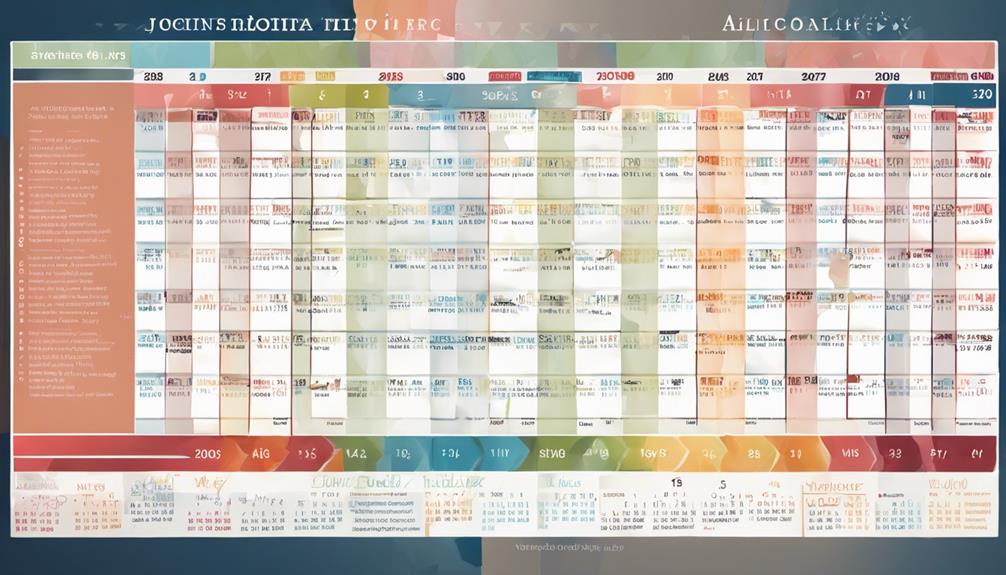Many individuals believe that a separation period is necessary for divorcing in Florida, but in reality, there is no mandated duration of separation before filing.
This flexibility allows couples to navigate the divorce process based on their own unique circumstances. Understanding the intricacies of divorce laws in Florida can significantly impact the outcome of your case and the overall process.
Let's explore the specifics of how Florida handles divorces and the key factors to consider when initiating this significant life change.
Key Takeaways
- Florida does not require a specific separation period before filing for divorce.
- Focus is on proving the marriage is irretrievably broken rather than on separation duration.
- 'No-fault' divorce is permitted in Florida, making separation time less relevant.
- Mental incapacitation for three years can also serve as grounds for divorce in Florida.
Florida's Residency Requirements for Divorce
When considering divorce in Florida, it's crucial to understand the residency requirements, which mandate living in the state for at least six months. Meeting this residency requirement is essential as it establishes jurisdiction for the Florida courts to handle your divorce proceedings.
Florida courts prioritize cases of residents to streamline the process and ensure proper jurisdiction over the parties involved.
However, complexities can arise if property is located out of state, requiring careful consideration during the divorce process in Florida.
Duration of Separation for Divorce in Florida

Upon deciding to dissolve a marriage in Florida, there's no mandated period of separation before initiating the divorce process. In the legal landscape of Florida, the focus is more on the concept of the marriage being irretrievably broken rather than a specified duration of separation. This means that couples can file for divorce once they've made the decision to end their marriage, without the necessity of a prolonged separation period.
Florida law allows for a 'no-fault' divorce, where the marriage is considered irretrievably broken, or in cases where a spouse has been mentally incapacitated for at least three years. It's important to note that while there's no specific separation period required, individuals seeking a divorce in Florida must meet residency requirements before commencing the divorce process. Understanding these aspects can help navigate the legal complexities involved in the divorce process in Florida efficiently.
Types of Divorce Processes in Florida
One may navigate the divorce process in Florida through various avenues, categorized as simplified, uncontested, and contested divorces, each offering unique paths to marital dissolution.
| Type of Divorce | Process Description |
|---|---|
| Simplified | Quick process for couples without minor children seeking alimony. |
| Uncontested | Requires agreements on child support, alimony, and property division, taking 4 to 6 weeks. |
| Contested | Involves disagreements on various aspects, can take 6 months to a year and may require mediation. |
In a simplified divorce, the process is expedited for couples without minor children who are not seeking alimony. Uncontested divorces necessitate mutual agreements on child support, alimony, and property division, typically resolved within 4 to 6 weeks. Conversely, contested divorces involve disputes that can prolong the process from 6 months to a year and may require mediation to resolve contentious issues. Understanding the differences between these divorce processes is crucial when considering legal representation and navigating the dissolution of marriage in various Florida counties.
Child Custody in Separation Cases

In separation cases in Florida, establishing child custody arrangements is crucial for ensuring the well-being of the children involved. Courts prioritize the best interests of the children when making decisions regarding child custody during a separation. Parenting plans play a significant role in outlining custody and visitation schedules to provide stability for the children. It's important to note that child support obligations can be determined and enforced even when a couple is separated without proceeding to an official divorce.
During separation, couples can create separation agreements that address various aspects of child custody, visitation, and support. These agreements help establish clear guidelines for co-parenting arrangements and ensure that the children's needs are met effectively. By determining child custody arrangements early on, parents can navigate the separation process with more clarity and focus on the well-being of their children. Understanding the laws surrounding child custody determination and enforcing child support can help parents make informed decisions during this challenging time.
Legal Separation Vs. Divorce in Florida
Navigating the complexities of legal separation versus divorce in Florida can present challenges for individuals seeking clarity on their marital status and legal rights. In Florida, unlike some other states, there's no formal legal separation system recognized by the courts. This means that separation agreements, although they can be drafted and agreed upon, aren't enforceable by judges as there's no mechanism for filing for legal separation.
However, courts in Florida can still address important matters such as child support and alimony during a separation period, even without a formal divorce filing. Postnuptial agreements can also serve as substitutes for legal separation, outlining asset treatment in case of a future divorce. Opting for legal separation in Florida may have advantages such as maintaining healthcare coverage, securing social security benefits, and addressing alimony considerations while still keeping the marriage intact legally.
Frequently Asked Questions
How Long Does It Take to Get a Divorce in Florida if Both Parties Agree?
If both parties agree on the terms of divorce in Florida, it can be finalized in as little as 3 weeks. This expedited process, known as a simplified divorce, is efficient for uncontested cases, aiding in swift resolution.
Is There a Waiting Period for a Divorce in Florida?
Yes, there is a waiting period for divorce in Florida. It allows time for reflection and potential reconciliation. The 20-day mandatory wait after filing ensures both parties carefully consider their decision, a standard practice in Florida divorces.
How Long Do You Have to Be Separated Before Divorce Is Automatic in Florida?
We understand the concern about divorce in Florida. There isn't an automatic provision based on separation duration. Residency requirements, not separation time, matter. Consult legal counsel for guidance on the process.
What Is the 7 Year Divorce Rule in Florida?
In Florida, the so-called '7-year divorce rule' doesn't apply. The focus is on the decision to end the marriage, not a specific separation period. Residency requirements are key. Couples can file for divorce when ready.
Conclusion
In Florida, you don't have to wait forever to get a divorce – just six months of residency. That's right, only six months!
So, if you're ready to end your marriage and move on with your life, Florida makes it easy for you.
Don't let the fear of a lengthy separation period hold you back – with the right information and guidance, you can start the next chapter of your life sooner than you think.










